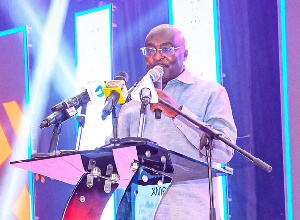- Home - News
- Polls
- Year In Review
- News Archive
- Crime & Punishment
- Politics
- Regional
- Editorial
- Health
- Ghanaians Abroad
- Tabloid
- Africa
- Religion
- Election 2020
- Coronavirus
- Photo Archives
- News Headlines
- Press Release
General News of Sunday, 11 September 2022
Source: ghanaiantimes.com.gh
Oduro Osae disagrees with CSOs over surcharge, disallowance powers of Auditor-General
Director-General of the Internal Audit Agency (IAA), Dr Oduro Osae, has expressed disagreement with the position of some civil society organisations (CSOs) in relation to the disallowance and surcharge powers of the Auditor-General (A-G).
He indicated that the view that the powers of the Auditor-General must be exercised in all cases was extreme.
“CSOs must take a realistic view of the surcharge and disallowance powers of the Auditor-General because it is not all recommendations that will require the Auditor-General to issue disallowance and surcharge but on a case-by-case basis,” Dr Osae contended.
On Monday, a group of CSOs picketed at the offices of the Attorney-General on the same issue, and OccupyGhana threatened to take legal action against the Auditor-General.
Ace Ankomah, a private legal practitioner and a member of the pressure group, OccupyGhana, debunked the assertion the Auditor-General should be hailed for being on time with the publication of the latest audit report since it had to be constantly reminded he owed the citizenry duty of publishing the report after he had submitted it to Parliament.
Dr Osae admonished CSOs and OccupyGhana “if they want to help citizens, they should conduct an analysis of the Auditor-General’s report and establish the ones they think are supposed to be disallowed and surcharged for which he has refused to do and present those as a credible case to Ghanaians but to say he has failed to exercise his surcharge and disallowance under Article 187 is going too far.”
However, Mr Ankomah revealed that the group had to threaten the Auditor-General with legal consequences to compel him to release the 2021 audit report to the public in August after sending it to Parliament for six months which was stated in the Audit Service Act.
According to him, the group had to threaten him before he published the report by writing to him before the report appeared on the website of the Audit Service and should not be praised and apparently, it was sent to Parliament in June.
Mr Ankomahpointed out that the Auditor-General made them aware he did not have evidence to issue disallowance and surcharge and was investigating and gathering evidence before he did them.
Entertainment

Bawumia’s $80 bn market value claim for Spotify, false!
Opinions








